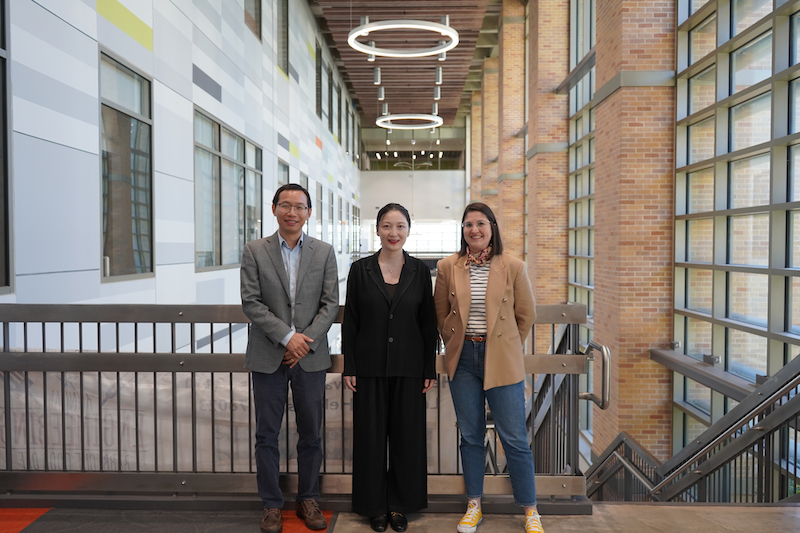Posted on December 13, 2023 by Sean M. Wood

Yuanxiong Guo, Yanmin Gong, Carolina Vivas Valencia (from left to right).
A trio of UTSA professors have won a nearly $1 million grant from the National Institutes of Health (NIH) AIM-AHEAD to close disparities in the treatment of opioid addiction. Over the next two years, Yanmin Gong, Ph.D.; Carolina Vivas-Valencia, Ph.D.; and Yuanxiong Guo, Ph.D. said they will use machine learning (ML) to improve compliance with treatment and personalize treatment plans for patients with opioid use disorder (OUD).
Medication for opioid use disorder (MOUD) has been proven effective when taken consistently as prescribed. However, individuals seeking treatment often face a fragmented system that presents barriers to accessing effective services. These professors plan to use advanced ML techniques to identify subgroups with different adherence to MOUD and the factors contributing to these differences.
“We want to make sure everyone can access the right services, no matter where they come from or their social situation,” said Gong, associate professor of electrical and computer engineering in the Margie and Bill Klesse College of Engineering and Integrated Design. “We’re using ML techniques to identify the disparities among different groups of people in adherence to MOUD. We’ll also develop personalized predictions for how well someone will adhere to their MOUD treatment plans.”
Keeping patients in MOUD is important to improving their health and saving lives. However, not enough research has been done on why some people have trouble adhering to their treatment, especially those from disadvantaged or marginalized groups. This project will study the issue and find ways to make sure everyone gets the help they need.
“We delved into the issue of OUD driven by its substantial impact on the quality of life for millions of U.S. citizens,” said Vivas-Valencia, assistant professor of biomedical engineering. “The widespread prevalence of OUD, along with the escalating rates of overdose deaths and low treatment entry, highlights the urgent need for effective interventions in the ongoing opioid epidemic. This exploration has allowed us to better understand the root causes and consider potential solutions to address this critical public health challenge.”
“More than 130 people a day die from opioid-related drug overdoses in the U.S.,” Guo said. “In Texas, one in four residents has experienced an opioid overdose or knows someone who has. Investigation of OUD could save lives and provide life-long support to Texans with OUD.”
“Our project reduces health disparities by improving treatment adherence for MOUD among patients from disadvantaged or marginalized groups, which ensures equitable access to effective opioid use disorder treatment and improving overall health outcomes,” Gong said.
The project is being funded by the NIH through the Institute for Health Disparities at the University of North Texas Health Science Center. The project will also involve collaboration with UT Health Houston.

